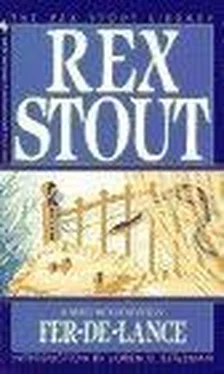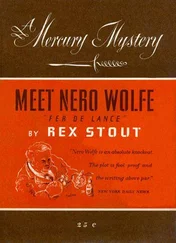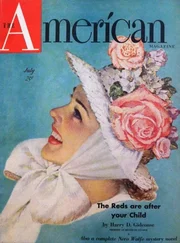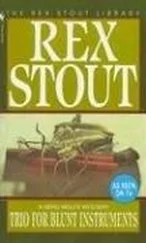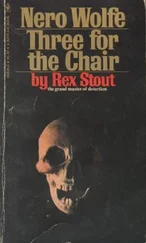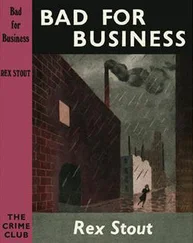Rex Stout - Fer-De-Lance
Здесь есть возможность читать онлайн «Rex Stout - Fer-De-Lance» — ознакомительный отрывок электронной книги совершенно бесплатно, а после прочтения отрывка купить полную версию. В некоторых случаях можно слушать аудио, скачать через торрент в формате fb2 и присутствует краткое содержание. Жанр: Старинная литература, en-GB. Описание произведения, (предисловие) а так же отзывы посетителей доступны на портале библиотеки ЛибКат.
- Название:Fer-De-Lance
- Автор:
- Жанр:
- Год:неизвестен
- ISBN:нет данных
- Рейтинг книги:5 / 5. Голосов: 1
-
Избранное:Добавить в избранное
- Отзывы:
-
Ваша оценка:
- 100
- 1
- 2
- 3
- 4
- 5
Fer-De-Lance: краткое содержание, описание и аннотация
Предлагаем к чтению аннотацию, описание, краткое содержание или предисловие (зависит от того, что написал сам автор книги «Fer-De-Lance»). Если вы не нашли необходимую информацию о книге — напишите в комментариях, мы постараемся отыскать её.
Fer-De-Lance — читать онлайн ознакомительный отрывок
Ниже представлен текст книги, разбитый по страницам. Система сохранения места последней прочитанной страницы, позволяет с удобством читать онлайн бесплатно книгу «Fer-De-Lance», без необходимости каждый раз заново искать на чём Вы остановились. Поставьте закладку, и сможете в любой момент перейти на страницу, на которой закончили чтение.
Интервал:
Закладка:
Sarah Barstow was expecting me at ten, and I was right on the dot. I parked the roadster in a graveled space the other side of the entrance, and pushed the button at the door on the terrace. It was standing open, but double screen-doors kept me from seeing much inside. Soon there were footsteps and one of the screens came out at me and with it a tall skinny guy in a black suit.
He was polite. "If you will excuse me, sir. Mr. Goodwin?"
I nodded. "Miss Barstow expects me."
"I know. If you will come this way. Miss Barstow would like you to join her in the garden."
I followed him across the terrace and along a walk to the other side of the house, then down an arbor and among a lot of shubbery till we came to an acre of flowers. Miss Barstow was on a shady bench over in a corner.
"All right," I said. "I see her."
He stopped, inclined his head, and turned and went back.
She looked bad, worse than she had the day before. She probably hadn’t slept much. Forgetting or disregarding Wolfe’s instructions on that detail, she had telephoned before six o’clock. I had taken the call, and her voice had sounded as if she was having a hard time of it. She had been short and businesslike, just said she would expect me at ten in the morning and hung up.
She invited me to sit beside her on the bench.
At bedtime the evening before Wolfe had given me no instructions whatever. Saying that he preferred to leave me fancy free, he had merely repeated his favorite saying, any spoke will lead an ant to the hub, and had reminded me that our great advantage lay in the fact that no one was aware how much or how little we knew and that on account of our original coup we were suspected of omniscience. He had finished, after a yawn that would have held a tennis ball: "Return here with that advantage unimpaired."
I said to Miss Barstow, "You may not have any orchids here, but you certainly have a flower or two."
She said, "Yes, I suppose so.-I asked Small to bring you out here because I thought we should not be interrupted. You will not mind."
"No indeed. It’s nice out here. I’m sorry to have to pester you, but there’s no other way to get the facts. Wolfe says that he feels phenomena and I collect facts. I don’t think that means anything, having looked up the word phenomena in the dictionary, but I repeat it for what it’s worth." I took out my notebook. "First just tell me things. You know, the family, how old are you, who you’re going to marry and so on."
She sat with her hands together in her lap and told me. Some of it I had read in the papers or got out of Who’s Who, but I didn’t interrupt. There was only her mother, her brother and herself. Lawrence, her brother, was twenty-seven, two years older than her; he had graduated from Holland at twenty-one and had then proceeded to waste five years (and, I gathered between the lines, a good portion of his father’s time and patience also). A year ago he had suddenly discovered a talent for mechanical design and was now devoted to that, especially as applied to airplanes. Her mother and father had been mutually devoted for thirty years. She could not remember the beginning of her mother’s difficulty, for that had been years before when Sarah was a child; the family had never considered it a thing to be ashamed of or to attempt to conceal, merely a misfortune of a loved one to sympathize with and as far as possible to ameliorate. Dr. Bradford and two specialists described it in neurological terms, but they had never meant anything to Sarah, to her the terms had been dead and cold and her mother was alive and warm.
The place in Westchester was the Barstow family estate, but the family was able to be there less than three months of the year since it was necessary to live at the university from September to June. They came each summer for ten or eleven weeks with the servants, and closed the place up each fall on leaving. They knew many people in the surrounding countryside; her father’s circle of acquaintance had of course been wide not only in Westchester, and some of his best and oldest friends lived within easy driving distance from the estate. She gave the names of these and I took them down. I also listed the names of the servants and details regarding them. I was doing that when Miss Barstow suddenly got up from the bench and moved away to the path in the sunshine, from under the shelter of the trees that shaded us. There was the sound of an airplane overhead, so close that it had forced us to raise our voices. I went on writing, "-Finnish, 6 yrs, NY agcy, sgl," and then looked at her.
Her head was way back showing all her throat, with her gaze straight above, and one arm was up waving a handkerchief back and forth. I jumped out from under the trees and cocked an eye at the airplane. It was right over us, down low, and two arms could be seen extended, one from one side and one from the other, waving back at her. The plane dipped a little, then swung around and headed back, and soon was out of sight behind the trees. She went back to the bench and I joined her; she was saying: "That was my brother. This is the first time he has been up since my father-"
"He must be pretty reckless, and he certainly has long arms.
"He doesn’t fly; at least, not solo. That was Manuel Kimball with him, it’s Mr. Kimball’s plane."
"Oh. One of the foursome."
"Yes."
I nodded and went back to facts. I was ready for golf. Peter Oliver Barstow had not been a zealot, she said. He had rarely played at the university, and not oftener than once a week, occasionally twice, during the summer. He had nearly always gone to Green Meadow, where he was a member; he of course had had a locker and kept his paraphernalia there. He had been quite good, considering the infrequency of his play, averaging from ninety-five to a hundred. He had played usually with friends his own age, but sometimes with his son and daughter. His wife had never tried it. The foursome of that fatal Sunday, E.D. Kimball and his son Manuel and Barstow and his son Lawrence, had never before played together, she thought. Probably it had been an accident of propinquity; her brother had not mentioned whether it had been prearranged, but she knew that he did sometimes have a game with Manuel. She especially doubted that the foursome had been arranged beforehand because it had been her father’s first appearance at Green Meadow that summer; the Barstows had come to Westchester three weeks earlier than their custom on account of Mrs. Barstow’s condition, and Barstow had expected to return to the university that Sunday night.
When she had said that Sarah Barstow stopped. I glanced up from my notebook. Her fingers were twisted together and she was staring off at the path, at nothing. She said, not to me, "Now he will not return there at all. All the things he wanted to do-all he would have done-not at all-"
I waited a little and then shook her out of it by asking, "Did your father leave his golf bag at Green Meadow all year?"
She turned back to me. "No. Why-of course not, because he sometimes used them at the university."
"He had only the one bag of clubs?"
"Yes!" She seemed emphatic.
"Then he brought them with him? You only got here Saturday noon. You drove down from the university and the luggage followed in a truck. Was the bag in the car or in the truck?"
It was easy to see that I was touching something raw. Her throat showed muscles and her arms pressed p ever so little against her sides; she was tightening up.
Читать дальшеИнтервал:
Закладка:
Похожие книги на «Fer-De-Lance»
Представляем Вашему вниманию похожие книги на «Fer-De-Lance» списком для выбора. Мы отобрали схожую по названию и смыслу литературу в надежде предоставить читателям больше вариантов отыскать новые, интересные, ещё непрочитанные произведения.
Обсуждение, отзывы о книге «Fer-De-Lance» и просто собственные мнения читателей. Оставьте ваши комментарии, напишите, что Вы думаете о произведении, его смысле или главных героях. Укажите что конкретно понравилось, а что нет, и почему Вы так считаете.
